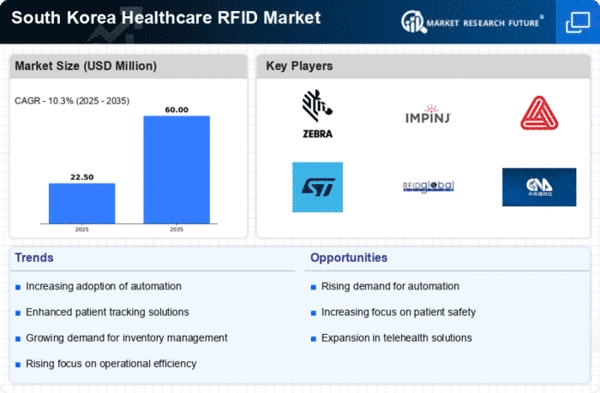Enhanced Inventory Management
The healthcare rfid market is experiencing a notable shift towards enhanced inventory management solutions. Hospitals and clinics in South Korea are increasingly adopting RFID technology to track medical supplies and equipment in real-time. This shift is driven by the need to reduce costs associated with inventory mismanagement, which can lead to wastage and inefficiencies. According to recent data, hospitals that implement RFID systems report a reduction in inventory costs by up to 30%. This trend not only streamlines operations but also ensures that critical supplies are readily available, thereby improving patient care. As the healthcare sector continues to evolve, the demand for efficient inventory management solutions is likely to propel the growth of the healthcare rfid market.
Increased Focus on Patient Care
The healthcare RFID market is significantly influenced by the increasing focus on patient care. South Korean healthcare providers are recognizing the importance of utilizing RFID technology to enhance patient safety and streamline care processes. By implementing RFID systems, hospitals can track patient movements, monitor medication administration, and reduce the risk of errors. This focus on improving patient outcomes is leading to a surge in RFID adoption, as facilities aim to provide a higher standard of care. The healthcare rfid market is likely to expand as more institutions prioritize patient-centric solutions that leverage technology to enhance the overall healthcare experience.
Growing Demand for Real-Time Data
The healthcare RFID market is witnessing a growing demand for real-time data analytics, becoming vital for decision-making processes in healthcare facilities. In South Korea, healthcare providers are leveraging RFID technology to gather and analyze data on patient flow, equipment usage, and inventory levels. This capability allows for more informed decisions, ultimately enhancing operational efficiency. Reports indicate that healthcare organizations utilizing real-time data analytics can improve patient throughput by as much as 25%. As the need for data-driven insights continues to rise, the healthcare rfid market is poised for significant growth, driven by the integration of advanced analytics into RFID systems.
Regulatory Compliance and Standards
Regulatory compliance plays a crucial role in the healthcare rfid market, particularly in South Korea, where stringent regulations govern medical practices. The government has established guidelines that encourage the adoption of RFID technology to enhance traceability and accountability in healthcare settings. Compliance with these regulations is essential for healthcare providers to avoid penalties and ensure patient safety. As a result, many institutions are investing in RFID systems to meet these standards, which is expected to drive market growth. The healthcare rfid market is likely to see an increase in demand as organizations strive to align with regulatory requirements, thereby fostering a culture of safety and efficiency.
Technological Advancements in RFID Solutions
Technological advancements are driving innovation within the healthcare rfid market, particularly in South Korea. The development of more sophisticated RFID tags and systems is enabling healthcare providers to implement more effective tracking and management solutions. Innovations such as passive RFID tags, which are cost-effective and have a longer lifespan, are becoming increasingly popular. Additionally, the integration of RFID with other technologies, such as artificial intelligence and machine learning, is enhancing the capabilities of RFID systems. As these advancements continue to emerge, the healthcare rfid market is expected to grow, as organizations seek to adopt cutting-edge solutions that improve operational efficiency and patient care.























Leave a Comment